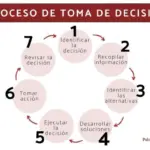
Deciding what to study is a very important decision, so it is common to think about it a lot before making the final decision, since choosing what to study is something that will direct your future career and to which you will have to dedicate a lot of time. Furthermore, it is a time in life in which it is customary to generate a lot of pressure and stress, since the fear of not obtaining a sufficient grade to go to a certain university appears, you have to choose between several options of which none of them will end. to convince, you are afraid of change, among others.
Have you been thinking about it for a while because you don’t know what to study? If you find yourself in this situation, it may be very useful for you to consult this PsychologyFor article: I don’t know what to study: what do I do?
Options if you don’t know what to study
Usually, both society and our families try to tell us that the only option that will give us a good job is to study a university degree and when the time comes you ask yourself, what can I do if I don’t know what to study? In this situation you need to know other alternative options They can also allow us a good job or even access to university without having to go through a baccalaureate or selectivity. So, if you have in mind the phrase “I don’t know what to study: what do I do?”, you have these options:
Formative Cicle of medium grade
This type of academic training is accessed through the ESO qualification, passing specific access tests for people over seventeen years of age (they are held once a year), having passed the university entrance test for people over twenty-five years of age. or having passed a specific training course for access or with a basic vocational training qualification. These are specialized studies in a specific profession, which allow you to acquire the necessary skills to be able to carry out said profession. For example, there are medium-level training cycles in cooking, administration, carpentry, among others. It is a good option if you don’t know what to study.
Higher education training cycle
In the same way as in intermediate level training cycles, these are studies that allow the student to acquire the skills and knowledge necessary to be able to carry out a specific profession. This type of academic training is accessed through a high school diploma, passing specific entrance tests for those over 19 or 18 in the case of having an intermediate degree (they are held annually), it is also useful to have a training cycle title of intermediate degree and pass the adaptation course for incorporation into the higher degree, having passed the university entrance test for those over 25 or having a university degree.
It is common for people who have already completed a medium-level training cycle on a specific profession to continue their training at a higher level, for example, a person who studied a medium-level training cycle in cooking will later take a higher-level training cycle. kitchen top. Besides, Obtaining this qualification allows access to university without having to take the selectivity, but through the average grade of the course. These cycles can usually last about two years. Therefore, if you don’t know what to study, they are a good option.
Online university career
If you have “I don’t know what to study at university” or “I like many things but I don’t know what to study” you have different options. If you do not know what degree to study or if your case is that you cannot decide what to study because you live far from face-to-face universities and studying in them would entail a significant financial expense, you should know that there is the possibility of studying a university degree remotely, that is, , through computer resources.
Volunteering
If you still don’t know what professional field you want to dedicate yourself to in the future, you can volunteer where you think you might fit in, such as volunteering in a nursing home. While volunteering you really realize if you like that environment and the people you deal with.
Work
You can use the experience that the job gives you to be able to consider what you would like to train in. See what the working world is like, also how you are working and what you like most. This way you will have more information to decide what to study.
Sabbatical
If you don’t want to study or work, you can take a year or a certain period of time to do other activities. It is about not studying at an institution for a certain amount of time, whichever you consider correct. Ideally, during this time you can think and spend time getting to know yourself better. As well as knowing better the different job options that each type of degree allows.
How do I know what I want to study?
What to do if you don’t know what to study? If the phrase “I don’t know what to study” continually runs through your head, these tips could be useful:
- Discover what you like to do and what you would like to dedicate yourself to. At the same time, you can discover everything that you do not like or interest. Here you can see how to find your path and vocation if you don’t know what to study and you don’t like anything.
- Find out what studies are necessary to work on something that meets the activities you like to do.
- Discover your skills, your strengths and weaknesses. Once located, find out which studies and/or workplaces include tasks or functions where you can develop your skills and strengths, and if applicable, improve and strengthen weak points.
- Find out about career opportunities of the studies that catch your attention.
- Find out how to access to these studies.
- Contact a counselor educational and/or work. If you are studying at an institute or any other educational center, you will probably have a counselor at your disposal who can answer your questions. Otherwise, you can contact a counselor who offers a service outside the school.
- get in touch with people who are dedicated to what interests you and know their opinion and experience.
- You can go to informative talks that occur in universities.
Vocational test
If the phrase “I don’t know what I want to study” represents you, you probably feel confused. Deciding what to study when you don’t know what to study can be complicated. Maybe you feel like you don’t know what to study because you like many things or maybe none. Probably, you are young and need to live more experiences that will allow you to get to know yourself better and find out what you want to do professionally. Typically, this answer is right at the crossroads between these two variables:
- What you are good at, that is, what you are good at.
- What you like, are interested in and are passionate about.
What to do if I don’t know what to study? To make it easier to find answers to your questions, we provide you with a vocational guidance test, that is, a test to know what to study according to your personality. This test will offer you an answer, free and immediate, based on your way of being.
This article is merely informative, at PsychologyFor we do not have the power to make a diagnosis or recommend a treatment. We invite you to go to a psychologist to treat your particular case.
If you want to read more articles similar to I don’t know what to study: what do I do? we recommend that you enter our Personal Growth and Self-Help category.
Bibliography
- Educaweb. (sf). Academic orientation. Vocational training-FP.Medium level training cycles (CFGM).
- Educaweb. (sf). Academic orientation. Vocational training-FP. Higher degree training cycles (CFGS).








